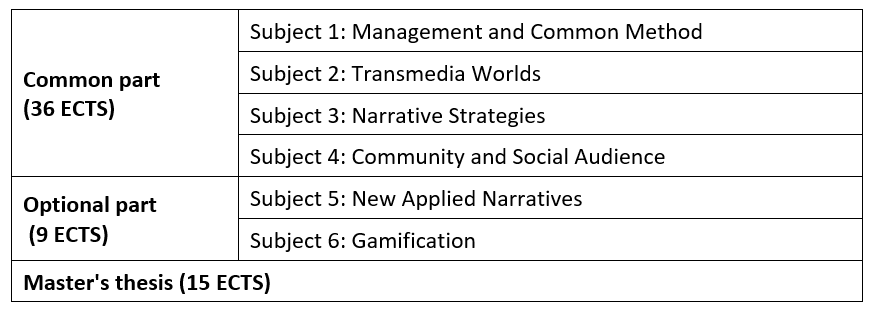 Gandia Campus, Universitat Politècnica de València
Gandia Campus, Universitat Politècnica de València
Master's Degree in Transmedia Communication
60 credits
Credit 35,34€
(2023/2024)
Give access to scholarships
30 openings
(2024/2025)
INTRODUCTION
Transmedia storytelling is a type of narrative in which the story unfolds through multiple media and communication platforms. Thus, stories appear interrelated while, at the same time, maintaining their narrative independence and having each of them a complete meaning. This can be understood as a story being told from different perspectives, according to the medium used in each case: a book, a comic, an Internet post, an ad, a television series, the social media, virtual and augmented reality, cinema or a videogame. As far as production is concerned, it requires creating content that 'gets the public hooked' by using different techniques. To achieve this, transmedia production develops stories through different media formats in order to release unique pieces of content for each channel. It is essential that these pieces of content are openly or subtly linked to each other, and that there is narrative synchrony between them.
Transmedia consists in expanding a project to multiple media, so that each of them contributes a different and significant part to the whole, and in this way, their potential is made the most of; together, they allow the audience to participate in different ways. The audience is therefore an active one, seeking to interact and decide on the content - even contribute to it and improve it. Any project requires an approach that includes integration and synergy between the multiple media windows that make up our environment. Today, transmedia has become an option for any audiovisual, communicative, cultural, educational or business project. Transmedia thinking means understanding projects as networks; their elements, as subsets of networks to be explored and exploited; and the role of the transmedia creator and producer, as the architect of such projects.
OBJECTIVES
The main objective of this master's degree is to train highly qualified professionals for the production of transmedia projects, who can practise communication as a comprehensive way to generate projects expanded to multiple media that enhance interaction with the audience and feed on it. They should also be able to function in their socio-economic context, and be encouraged to experiment and research in the field of creation, and to adapt to the professional sectors of communication in which they can apply the technical and creative knowledge that they have acquired.
This master's degree responds to the demand for training in the field of communication, and in particular, to the new scenarios resulting from the emergence of social media and the new media consumption models. Its programme has been designed to allow students to immerse themselves in the work processes used by today's communication companies, experiment with new narratives, and research into them.
STRUCTURE OF THE MASTER'S DEGREE
This master's degree comprises a common part (36 credits, divided into 4 subjects), an optional part (9 credits, to be chosen from among several subjects corresponding to 2 areas) and the master's thesis.

WHO IS FOR?
This master's degree is aimed at those students who hold a university degree and wish to expand their training in the fields of audiovisual communication, and visual and sound arts.
The multidisciplinary nature of these areas of knowledge, and their relationship with sound and image technologies, determine that the following degrees (or those that may replace them in the future) give candidates priority to access this master's degree (in the order in which they are mentioned here): Bachelor's Degree in Audiovisual Communication, Bachelor's Degree in Fine Arts (Audiovisual spec.), Technical Telecommunications Engineer (spec. in Sound and Image), Bachelor's Degree in Advertising and Public Relations, Bachelor's Degree in Journalism, Design Engineer, Bachelor's Degree in Business Administration and Management, etc.
The master's degree academic committee may consider accepting other degrees depending on the candidates' academic and professional profiles (be they Spanish or foreign), and modifying the access quotas by degree or group of degrees.
ADMISSION CRITERIA
The academic committee will select among the candidates by analysing their academic record, the adequacy of their training for this master's degree, their professional or research experience, and their motivation to pursue the master's degree.













